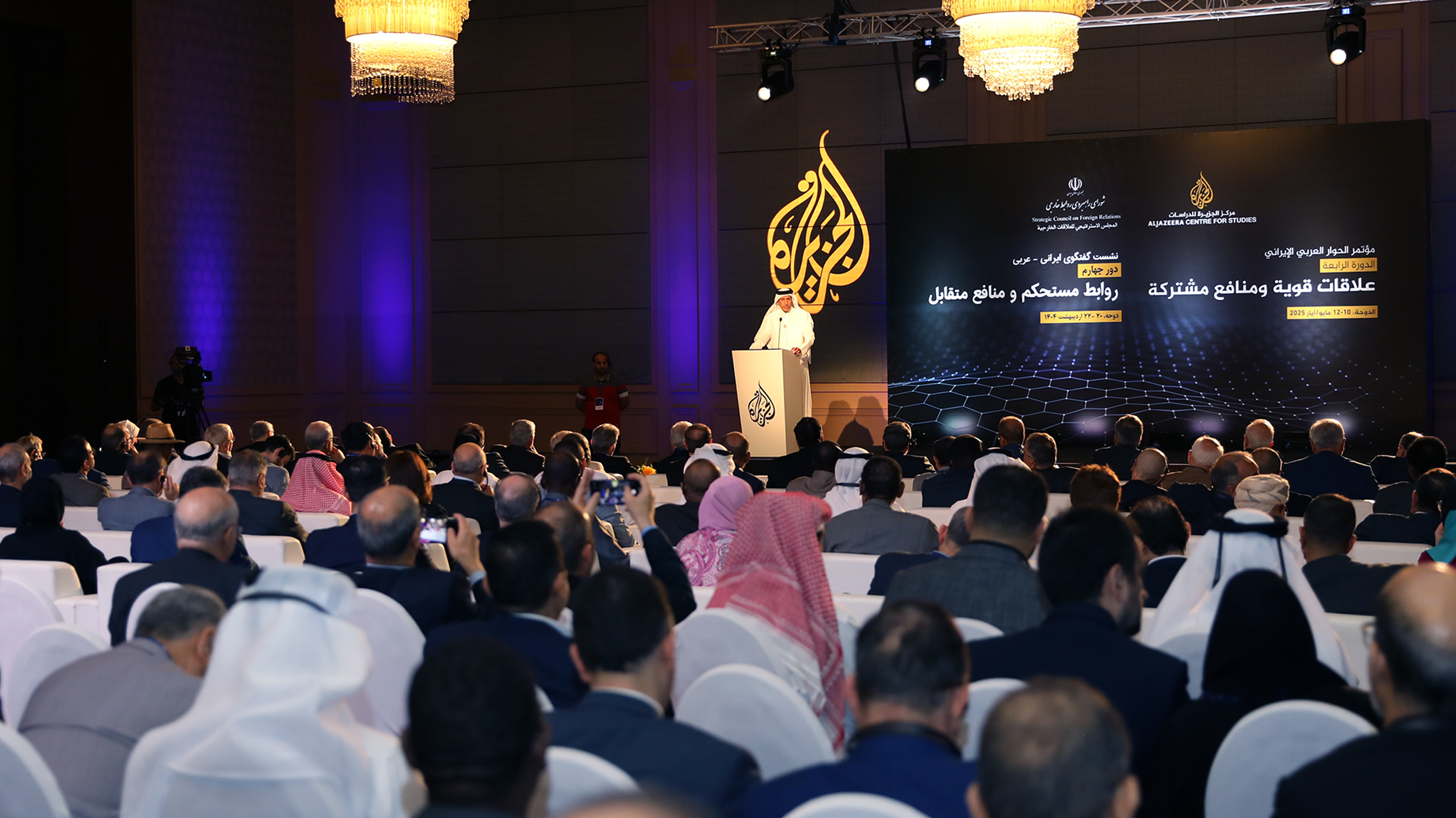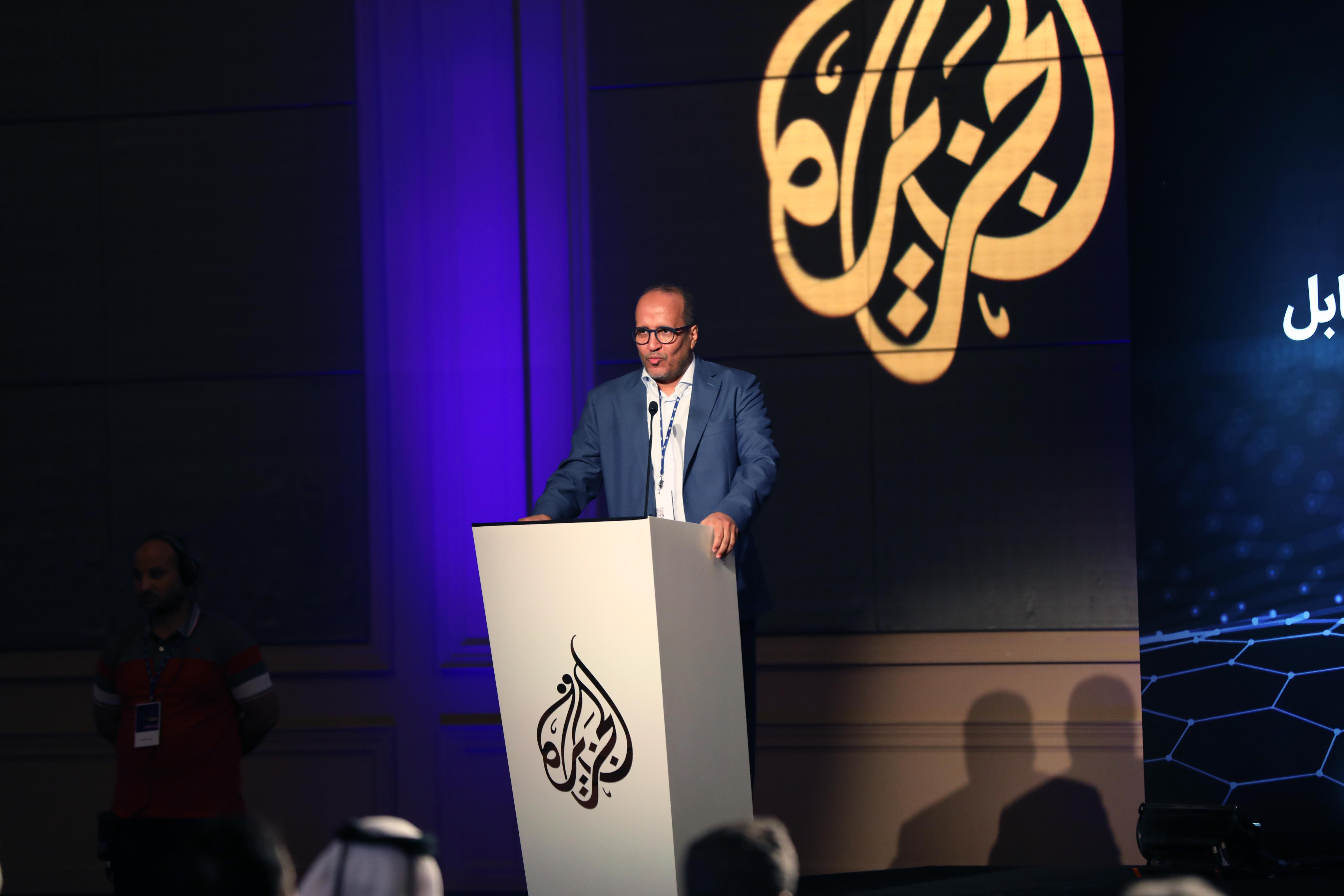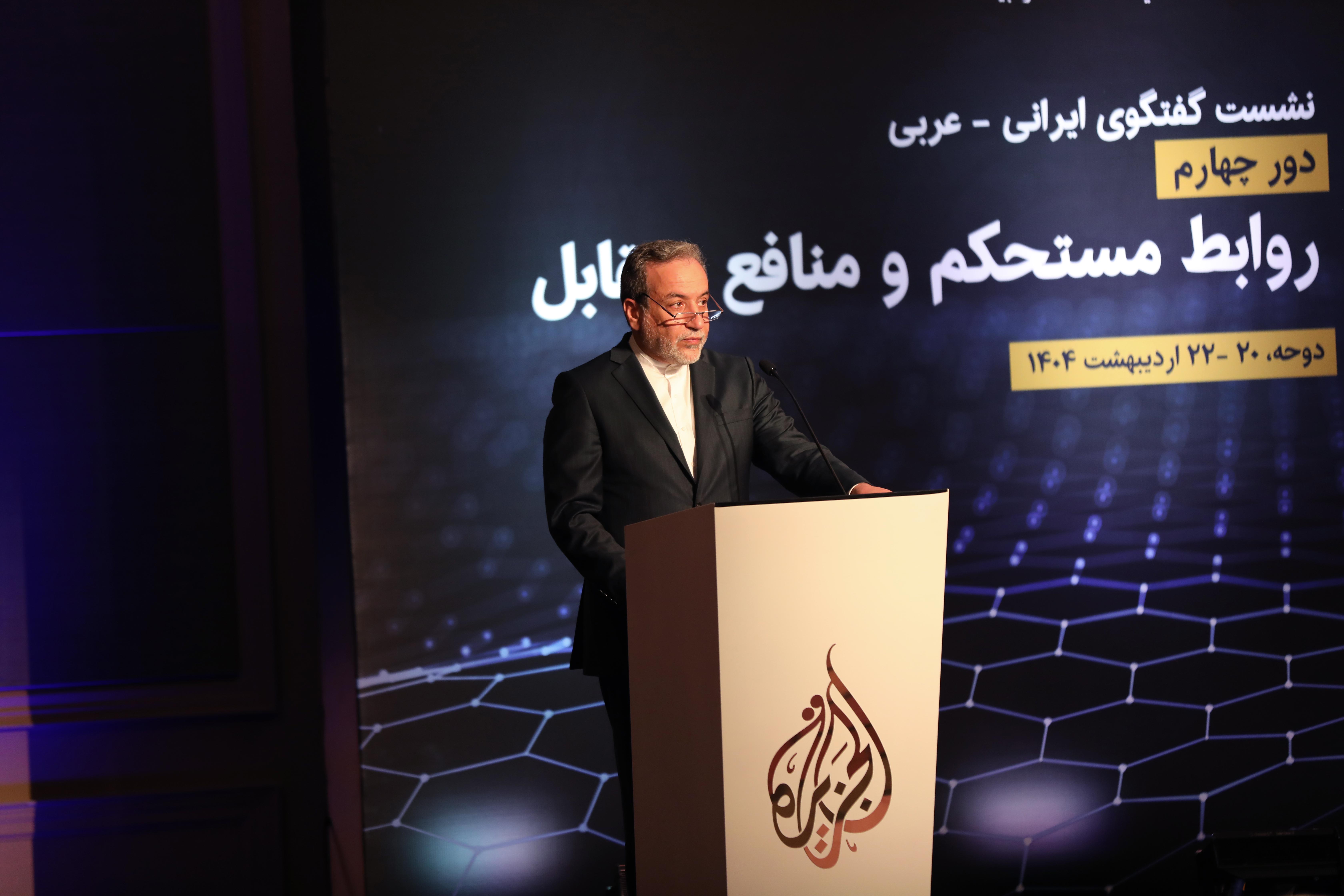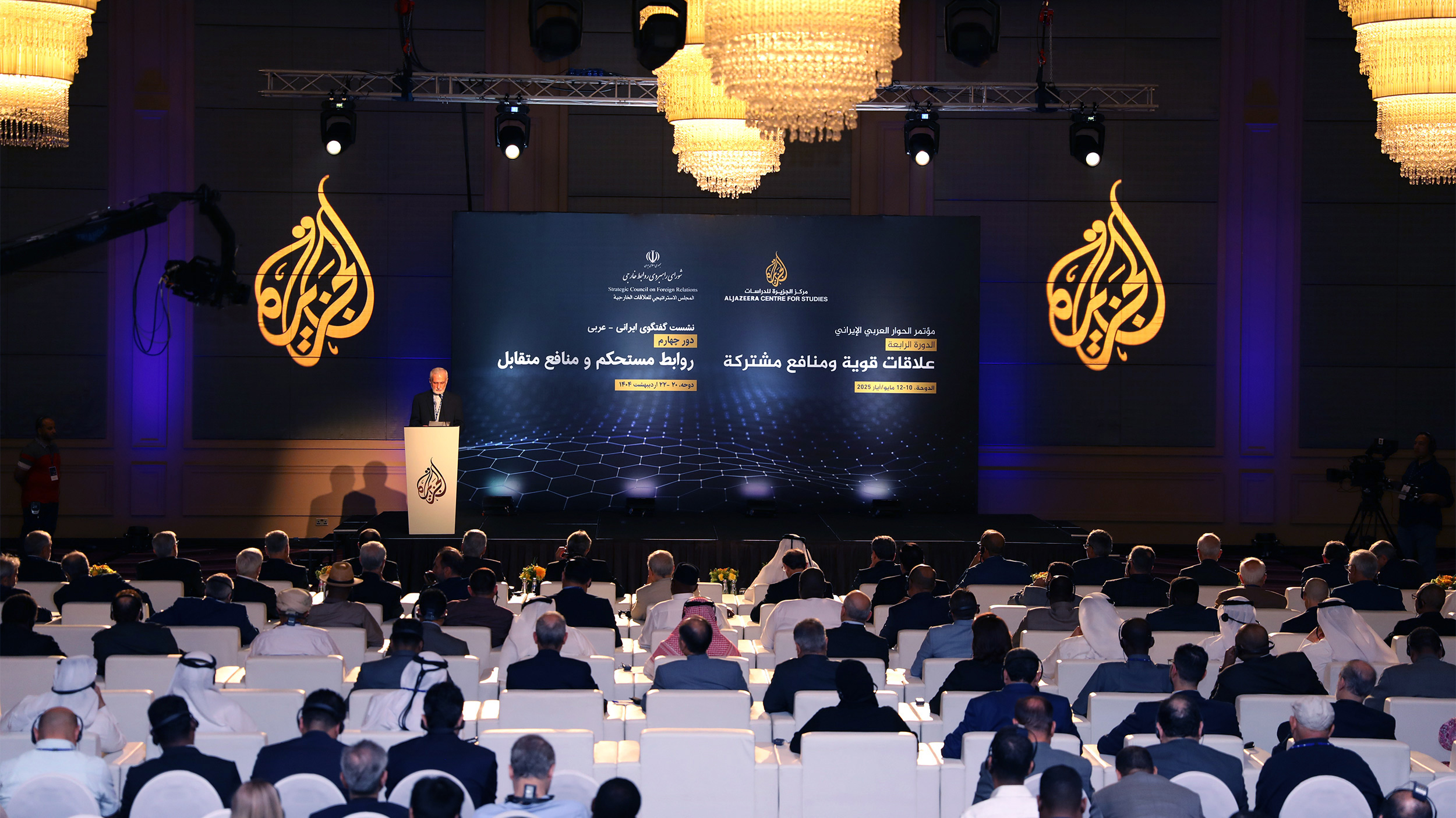
The fourth round of the Arab-Iranian Dialogue Conference concluded in Doha on 12 May 2025. Held from 10 to 12 May, the event was jointly organised by Al Jazeera Centre for Studies and Iran’s Strategic Council on Foreign Relations. Attendees included the Foreign Minister of the Islamic Republic of Iran, the Chairman of the Board of Al Jazeera Media Network, the directors of the organising institutions, and a distinguished group of politicians, experts and researchers from Arab countries and Iran.
Held under the title “Strong Relations and Mutual Interests”, this year’s conference focused on resolving disputes between Arab states and Iran, narrowing differences on contentious issues, and exploring avenues for political, security and economic cooperation.

The opening session began with a welcome address by Dr. Mohammed Mukhtar Al Khalil, Director of Al Jazeera Centre for Studies, who emphasised the importance of dialogue-based platforms in fostering common ground, addressing mutual challenges and offering practical policy suggestions.
Hamad bin Thamer: Dialogue is essential in a complex regional context
The first keynote address was delivered by Sheikh Hamad bin Thamer Al Thani, Chairman of the Board of Al Jazeera Media Network. He underlined the unique importance of Arab-Iranian dialogue given the region’s complex context, stressing the need for deep intellectual engagement and clear strategies to overcome current challenges. He noted that this dialogue transcends geography, rooted instead in a long history of civilisational interaction and shared interests.
Sheikh Hamad emphasised the urgency of continued and deepened dialogue, expressing hope that the discussions would yield innovative approaches to conflict resolution and regional stability. He also welcomed the negotiations between the United States and Iran in Oman, expressing hope for positive outcomes that would reduce tensions and contribute to both regional and global stability.
Abbas Araghchi: Regional understanding is the foundation of shared stability

Iranian Foreign Minister Dr. Abbas Araghchi delivered the second keynote speech. He noted that the Middle East is undergoing a critical phase requiring stronger cooperation among its countries. He reaffirmed Iran’s commitment to dialogue as a strategic necessity for addressing challenges and promoting stability.
Araghchi stated that Iranian-Arab relations are rooted in a deep civilisational and cultural heritage, calling for strengthened cooperation and overcoming divisions to ensure a more secure and developed future for the region. On the Iranian nuclear issue, he asserted that Iran does not seek nuclear weapons, which he described as religiously forbidden and absent from Iran’s defensive doctrine. However, he affirmed Iran’s full right to pursue peaceful nuclear energy, including uranium enrichment.
He revealed that the fourth round of indirect negotiations between Iran and the United States were going to take place soon, and maintained that a “fair and balanced” agreement remains possible if other parties abandon unrealistic demands.
Regarding Palestine, Araghchi reaffirmed Iran’s unwavering stance, calling it the central cause of the Islamic world. He condemned the “daily crimes and massacres” against Palestinians, especially in Gaza, calling Israel the greatest threat to regional security. He warned of the dangerous consequences of the occupation’s policies, particularly forced displacement and systematic killings, urging Muslim nations to fulfil the duty of supporting the Palestinian struggle.
On Gulf-Iranian relations, Araghchi hailed the positive developments in the past year, describing the first joint meeting between Iran and the Gulf Cooperation Council in four decades as a “significant step toward trust-building and regional partnership”. He called for strengthened economic and trade cooperation, particularly in energy, transport and technology, and expressed Iran’s openness to any initiative aimed at building an integrated regional economy based on mutual benefit.
He also emphasised the importance of activating cultural and scientific diplomacy, describing civilisational convergence as a solid foundation for lasting political and economic partnerships. He concluded by reaffirming Iran’s invitation to all regional actors to work collectively toward peace and stability, stating, “Iran extends its hand to build a shared future. Let us be partners in peace, not rivals in conflict.”
Kamal Kharrazi: Security and development depend on independent regional will

Dr. Kamal Kharazi, Head of the Strategic Council on Foreign Relations and former Iranian Foreign Minister, closed the opening session by stressing the need to institutionalise dialogue and enhance communication among the region’s intellectual elites. He praised AJCS for organising the event and emphasised the current need for mutual respect, sovereign equality and shared responsibility in achieving regional security and stability.
Kharazi asserted that collective security cannot be imported but must be built from within through regional consensus free of external interference. He said Iran advocates for active diplomacy focused on peaceful conflict resolution and fostering a secure and development-oriented regional environment.
On the economic front, Kharazi urged joint efforts toward collective development, noting the Middle East’s vast natural resources, which should be used to build complementary economies instead of fuelling unproductive regional competition. He also voiced Iran’s willingness to share its expertise in science and technology and to strengthen academic cooperation through joint research centres and universities.
Politically, he expressed concern over the intensifying conflicts in the region, particularly the ongoing Israeli aggression in Gaza. He called for activating legal and diplomatic tools to counter violations and support the Palestinian cause.
Kharazi concluded by calling for a comprehensive regional mechanism for security and economic cooperation, reflecting the collective will to build a stable, integrated future. He affirmed Iran’s openness to all initiatives that promote peace and regional prosperity.
Policy insights and intellectual approaches to key issues
Following the public opening session, a series of closed-door meetings were held over two days, addressing several critical topics—chief among them the Palestinian issue. Discussions focused on reassessing the Palestinian national project, its vision, priorities and tools, and the actors responsible for redefining it amid rapid regional and global changes.
Participants examined the roles of core Palestinian institutions, such as the Palestinian National Council, the Palestine Liberation Organisation and Palestinians in the diaspora, in shaping a representative and responsive national project.
Other sessions addressed Lebanon’s evolving political landscape, especially the diminishing influence of Hezbollah, the presidential election, and the appointment of a prime minister. Discussions analysed Lebanon’s delicate internal balance, Arab-Iranian intersections, and possible frameworks for reducing tensions and fostering sustainable political stability reflecting regional consensus and the aspirations of the Lebanese people.
Another session focused on Yemen, particularly the continued control of Sana’a by the Houthi movement (or Ansar Allah). Experts examined the group’s political outlook and positions on peace prospects, while also considering the views of other Yemeni factions and assessing the interests and roles of regional powers – especially Iran and Saudi Arabia – and the potential for alignment or conflict in shaping Yemen’s future.
The Syrian dossier also received considerable attention, especially following the fall of Bashar al-Assad’s regime to armed opposition groups and the resulting shifts in regional dynamics. Discussions explored Iran’s declining influence in Syria, the implications of this shift, and the urgent need to establish stability in the country as a prerequisite for broader regional peace.
Sessions also addressed diverging views among regional stakeholders – particularly Iran and Arab countries – of Syria’s future, potential reconstruction paths and possibilities for political and security consensus to end the conflict and enhance stability.
The final sessions explored prospects for Arab-Iranian economic cooperation, with a focus on Gulf countries. Participants emphasised the importance of activating partnerships by leveraging each side’s comparative advantages – such as financial resources, human capital, geographic location and energy reserves – to implement viable joint projects yielding mutual benefits.
Discussions also tackled key obstacles to cooperation, whether political, security-related or institutional, and explored ways to overcome them by building trust, expanding common ground, and strengthening legal and institutional frameworks to support lasting regional economic partnerships.
About the Arab–Iranian Dialogue Conference
The Arab–Iranian Dialogue Conference has emerged in recent years as a vital intellectual and political platform for strengthening communication between the Arab world and Iran and exploring the foundations of a sustainable strategic partnership capable of addressing regional and global challenges.
The conference was first launched in Doha in 2022, with subsequent editions as follows:
First Edition: Doha, 21-23 May 2022 — “The Arabs and Iran: A Dialogue about the Region’s Crises”
Second Edition: Doha, 27-29 May 2023 — “Approaches and Solutions to Security, Economy and Crises”
Third Edition: Tehran, 12-15 May 2024 — “Dialogue for Cooperation and Interaction”
In its fourth edition this year, the conference continued to foster constructive dialogue amid a highly complex regional environment, prioritising realistic understandings that could advance stability and regional integration.